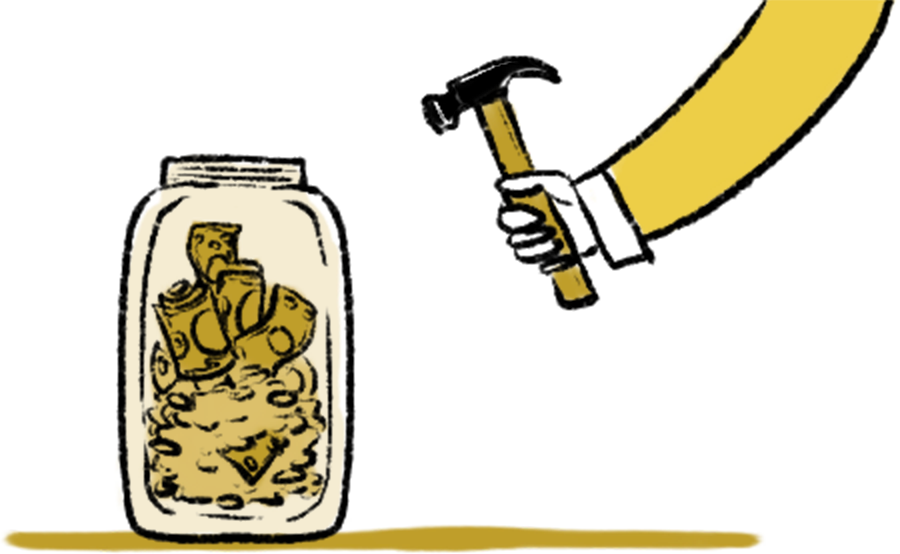Even if you’re financially responsible, life’s unpredictable nature can sometimes catch you off guard, at times making it dangerously easy to fall into debt. Discover how to start managing your debt with these tips and tools.
Types of Debt
While being in debt is never ideal, some types of debt are better than others because of the effect the debt can have on you or your net worth. To reflect this, debt is sometimes broken up into “good debt” and “bad debt.”
“Good Debt” is debt that is an investment back into yourself or that increases the value of what you own. That could include things like student debt or things that can grow in value over time such as a mortgage or investments.
“Bad Debt” is when you borrow for something that you are losing money on. This could include things like credit card purchases for clothes or food and payday loans. Because of how quick cars lose value, auto loans often walk the line between “good” and “bad” debt.
The main difference between good and bad debt is whether the investment will appreciate and grow in value or depreciate and lose value.
That being said, even if your debt is technically “good,” that doesn’t mean it won’t still end up hurting you if you become unable to make your payments.

BANZAI COACH SESSION • 5 MINUTES
Get Out of Debt
Make a customized plan to be completely debt-free.
Click here to read how this tool works, and for disclaimers.
Debt Strategies
There are strategies to help you get back in control if you’ve found yourself falling behind or growing impatient with your debt payments.
- Debt Snowball Method: With this method, you start small and work your way up. Begin by paying off your smallest debt first. Then, take the amount you were paying for that debt and pay it toward the next smallest debt, and so on until everything is paid off.
- Debt Avalanche Method: Just like an avalanche, you knock out the big things first and then work your way down. Focus on paying off your highest interest rate first, then roll those funds into the next highest, and then the next.
- Debt Management Plan: This is a plan set up by a non-profit or credit counseling agency to help you pay off your debts. Your counselor negotiates and handles everything with your lenders, often helping you get a lower interest rate or waiving fees. Once it’s set up, you only need to make a single payment to the agency, they handle the rest.
- Debt Consolidation: Debt consolidation allows you to combine all of your debts into one payment by taking out a new loan, ideally with a lower interest rate, and using it to pay off your debts. Be careful though, sometimes you could end up being in debt longer because of the new loan and thus paying more interest overall.
The Banzai Get Out of Debt Coach can help you make a customized plan to pay off your debt and learn more about what some of these strategies could look like for you.

BANZAI COACH SESSION • 5 MINUTES
Repairing Credit
Learn to take action when your credit score isn’t ideal.
Click here to read how this tool works, and for disclaimers.
Tips to Get Out of Debt
Beyond the major strategies, there are other adjustments that you can make to your approach to debt and daily spending habits that can make a large impact.
- Reduce Expenses: The simplest thing you can do, if you act quickly, is stop spending on anything that isn’t essential. Since debt doesn’t go away by itself, the faster you stop adding to the problem the better. You might also consider how to reduce your expenses in the short-term, for example, by subletting your apartment or renting out a room in your home until you can get your debt under control.
- Pay More Than Your Minimum Balance: Adding even just a little bit of extra money to your monthly payment can help you pay off your debt sooner and pay less overall. Just how much of a difference can it make for you? Use the Debt Payoff Calculator below to find out.
Click here to read how this tool works, and for disclaimers.
- Negotiate With Your Creditors: If you can’t afford your minimum payment, you can ask your creditors to rewrite the terms of your credit agreements so that your bills are easier to pay off. This often means making smaller payments over a longer period of time, which does mean that you’ll end up paying more interest and therefore increasing the overall cost of resolving debt. But that’s usually a better solution in the long run than having to default or declare bankruptcy.
- Use Debt Counseling Services: If you need help dealing with your creditors or figuring out the best way to handle your debts, a non-profit credit counseling service may help. For a relatively modest charge, they’ll work with you to come up with a feasible repayment plan. For starters, you can check out the National Foundation for Consumer Credit online at nfcc.org. You can also use the Banzai Debt Coach to make a plan.
Be wary, though, of any debt counseling service that requires an upfront fee for a solution that doesn’t involve changes to your spending habits. Unscrupulous organizations prey on people at their most vulnerable, often by suggesting there is an easy, quick way to get out of debt.
Tapping Other Resources
If you’ve been contributing to a retirement savings plan at work, you may decide it’s better to tap this resource in a financial emergency rather than paying only the minimum due on your credit cards or skipping some payments altogether.

Illustration: Cristi Cash
Borrowing from your retirement funds to solve debt problems is not an ideal solution and should only be done after careful consideration. After all, you’ll still need income from your savings down the road. But if borrowing from your 401(k) or similar plan helps you put a halt to accumulating debt, that may help you get back on your feet faster. And, typically, you can repay the amount you’ve borrowed on a gradual basis through payroll deductions. The interest you pay goes into your account as well, rather than to a commercial lender. Withdrawing from your retirement funds, rather than borrowing from them, will incur penalties, so be wary. Learn more about tapping into your retirement funds with the Early Withdrawals From Retirement Savings article.
In some cases, people have used home equity loans to pay off debt. But that type of borrowing puts your home at risk if you default, so be careful. In addition, it’s much harder to find such loans today since this type of cash-out borrowing contributed in part to the housing crisis.
Emergency Funds
One of the smartest things you can do when things are going well is to establish an emergency fund as part of your savings plan. You should aim to set aside enough money to cover at least three to six months of living expenses. That way, if an unforeseen event puts a drain on your finances, you’ll have some back-up funds to help see you through. Check out the Emergency Funds article to learn more.
**Photo Credit: Eric Fellegy
